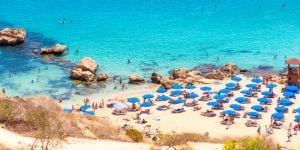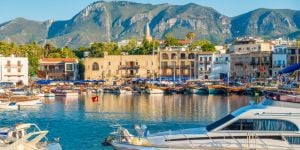Buyers beware.....
Note this article was from 2021 in March but is still very much relevant now... so buyers should if possible try to establish the state of the complexes books ....
Anyone who watched a Place in the Sun on Wednesday will have seen a woman who was viewing a holiday apartment in Cyprus break down in tears of joy.
The one-bedroom apartment had a sea view, with a communal pool and a balcony, close to amenities and a beach; everything that she and her husband had been looking for.
After some negotiation, the couple had their offer accepted and purchased the apartment.
But I expect, like so many others who have bought an apartment in Cyprus, she and her husband didn’t realise the problems they may face.
Communal fees
Apartments and other residential complexes with shared facilities comprising more than four units are required by law to have a Management Committee that regulates and manages all relevant affairs.
The owners of all units in these complexes must contribute to the costs of insuring, maintaining, repairing, restoring and managing the jointly-owned building. These contributions are known colloquially as communal fees.
On the face of it this is a very good idea and works well in other countries. Communal fees are used ensure that the building and its shared facilities such as swimming pools, gardens and tennis courts are maintained in good order thereby helping to maintain their look, value and the saleability of the units.
However, the law in Cyprus is unworkable. All too often problems arise as owners refuse to pay their communal fees. This problem is likely to get worse due to the pandemic as many people will have lost their jobs or are experiencing a severe drop in their income.
In cases where owners refuse to pay, the Management Committee has to cover the shortfall by raising the fees of the good payers to cover the shortfall. This causes resentment and often leads to a domino effect as more owners refuse to pay. Eventually the Management Committee resigns en masse and the buildings fall into disrepair and decay.
The only option open to the Management Committee is to sue the non-payers. This will cost in the region of €1,500 for legal fees and court costs – another expense that has to be covered by raising the fees of the good payers. In normal circumstances it takes 2, 3 or 4 years to get a court ruling against the non-payer.
The non-payer can claim they have no money and agree a long-term payment arrangement. This may delay payment for a further 2 or 3 years and if non-payer fails to comply with the payment arrangement, it’s back to the court with another €1,500 in legal fees and court costs, with no resolution of the problem.
The court may also rule against the non-payer by enabling the Management Committee to lodge a memorandum (memo) against properties owned by the non-payer for the debt. (This assumes that the debtor has title to the property – unacceptable delays issuing Title Deeds is another long-standing problem that has yet to be resolved.)
The memo prevents the non-payer selling, mortgaging and transferring the property until the debt has been repaid.
In these circumstances a memo is as much use as a third eyebrow as the debt will not be repaid in the foreseeable future.
Furthermore, a memo only remains in force for six years from the date that the judgement was registered with the Land Registry. It may be extended by two years each time by further court orders (and their associated costs.)
The law must be changed to protect the good owner who continue to pay and the Management Committee. Why should who are paying be forced to pay for those who refuse?
Apartment swimming pools
Under the laws of Cyprus, swimming pools in apartment and other residential complexes are considered to be “public swimming pools” and their operation is governed by the stringent laws and regulations governing their licensing and use. (The law dates to 1992 and is well past its sell by date.)
This has significant legal and financial implications for the Management Committees and the owners of these complexes.
Regardless of the size of the pool or the number of units on the complex, a lifeguard must be on hand when the pool is in use. To achieve this level of cover, it’s likely that two lifeguards would be needed at a cost in the region of €30,000/annum. Some larger complexes have two and occasionally three pools, each needing two lifeguards and their cost would be astronomical. (In reality there are not enough trained lifeguards in Cyprus to service the demand.)
To operate these pools an annual operating licence is required, which costs around €85 – and the pool equipment needs to be checked to ensure it meets safety requirements – another cost.
Anyone operating a pool without a licence or who acts contrary to the regulations, which includes lifeguarding, is guilty of a criminal offence. The offender faces a fine of up to €450 and, if the offence continues after conviction, they face an additional fine of €50/day for each day the offence continues.
In the past, authorities have turned a blind eye to the problem, which resulted in many pools being operated without a licence. But a couple of years ago the authorities in Paphos cracked-down; the municipality’s health inspectors discovered more than 170 swimming pools operating without a licence and served owners and tenants of these apartments with notices stating they were operating public swimming pools without licenses.
Management Committees had no option but to close their pools or face the consequences.
Together with Denis O’Hare and Linda Leblanc I brought this issue up at a meeting we had with the Interior Ministry in 2007. In 2011 MEP Arlene McCarthy raised the problem with the European Commission. And although new law was proposed in 2015, no progress has been made.
In 2008 a European Standards for swimming pools was introduced (EN 15288-1 and EN 15288-2) that classifies communal pools, such as those for in apartment complexes, according to their size and usage.
Complexes that share a pool for the use of the property owners, their families and guests are classed as Type 3 swimming pools, making it subject to different standards than a public swimming pool and would therefore not require lifeguards, etc.
However, for reasons best known to themselves, the Cyprus government has not implemented these EU regulations that would remove the need for lifeguards at a stroke.
I hope the couple who featured in A Place in the Sun and bought the one-bed apartment manage to avoid the problems with the inadequate and archaic laws and regulations governing communal fees and swimming pools. They’ll soon find out for themselves.
source - https://www.news.cyprus-property-buyers … d=00163697
perhaps its time to review the program to see how some of the buyers have got on ? . the presenters to not tell them everything ? .
As this issue has raised its head again with several complex properties having had their communal pools closed for failing to comply with the laws of Cyprus... Laws that are so far out of date it's just shameful.. requirements needed to comply are harsh and unachievable.... EU laws should have superceded them but Cyprus as usual have not followed EU laws.... .Cyprus laws on this matter date back 30 years to 1992 and 1996 and has been subject to debate several times but nothing has changed...Even our own complex pool has been closed...
So Maybe it's time to get this petition going again..sitting @ 5700 at moment it needs a minimum of 8000 to get to parliament for debate https://www.cypruscommunalguide.com/pet … hklt_msc..
This issue is still seriously problematic..for anyone in a complex with a communal swimming pool ..and it seems to be the case that if anyone is caught swimming in a public pool ( as identified in posts above) and or sunbathing around it now...will be subject to a €300 per person fine ...as well as every owner on that complex as they are by definition in the law the operator of the pool.... The fine wil be in addition to court costs.....whether the owners are observing and abiding by the law or not...
I think there are four questions to ask yourself ..
1 do you have only one household using the pool
2 do you have a licence
3 do you have a lifeguard
4 do you comply with all the other certification and building permit requirements ..
if you say no to any of them the pool is illegal and should be closed...
The swimming pool legislation is ridiculous unaffordable unenforceable and lifeguards aren't exactly hanging off trees waiting to be selected .. the problem seems to be Cyprus has failed to accept an EU "law".but it's not EU law it's EU guidance..... Guidance which Cyprus have not adopted.. and don't have to as it's not mandatory... But, whichever way you look at it... its put many people in a difficult position.. theyve invested heavily they are unable to use a pool legally and this law has devalued property as a result .... it needs to be resolved asap..
The knock on effect on future new build or resales in apartment complexes is very likely to be disastrous. Inability to sell without substantial loss, reduced tourism and conflicts between owners, "in contract" tenants and holiday let bookings who will not be allowed to use the pool they thought they were booking or renting. So thousands of cases of mis-selling, at advertiser's levels estate agents lawyers, online rental platforms etc etc potential for fines for everything is horrendous..,not to mention the abuse received either way when told pool closed. The frustrating thing is ..this could so easily be resolved simply by accepting and applying the EU guidance. Which surely has to be better and more appropriate than a 31 year old law....
This petition needs to be kick started .... We need to get to 8000
https://www.cypruscommunalguide.com/pet … 0Ahklt_msc
Further I suggest that everyone who is currently impacted by this including all those likely to be so should write or email their Municipality and contact the appropriate Minister responsible for this matter .... Currently.... minister@moi.gov.cy
A further thought on this for those on complexes without title deeds and or those who are contemplating a purchase of property on a complex without title deeds..and indeed those with title deeds with notes attached.... there are likely unfinished works and thus incomplete or no building permits or unauthorised works or work that has been done that doesn't comply with plans .... which, as these things have a bearing on the license application, also means any pools on such properties are also impacted by these laws... Making them illegal and rendering them legally closed
So beware be aware be wary ...ask for these things to be investigated make sure your lawyer makes these enquiries make sure you do your due diligence and know exactly what you are buying into ...
Latest
Both tourism and the property market in Cyprus are being damaged by outdated and unworkable laws governing swimming pools, which have seen many complexes closing theirs over the last few years.
The problem is that Cyprus recognises communal pools found at private complexes as public ones and therefore applies stringent law geared towards public facilities.
Peyia councillor Linda Leblanc has been campaigning since 2007 to get Cyprus legislation to differentiate between private communal pools and public ones and said it should be simple to implement EU standards. Peyia is now being forced to take action and complex owners are getting visits from officials to comply, she said.
“This position is really damaging to Cyprus tourism and the property market. We are encouraging people to come here for holidays and to invest in property and then disadvantaging them by this stupid law. There is a big disconnect and it could be easily solved,” she told the Cyprus Mail.
Extensive requirements need to be met to be granted a licence for a communal pool, and most in Cyprus would not meet them. This covers specific construction requirements and facilities, a qualified lifeguard on duty and a professional pool maintenance supervisor. The lifeguard must be on duty at all times during the pool’s operating hours.
However, under EU standards, complexes that share a swimming pool for the use by the property owners, their guests and families are classed as a Type 3 swimming pool. This means it is covered by different standards to that of a public swimming pool and wouldn’t require lifeguards and so many of the other stipulations. Under this European standard, ‘public’ pools are defined as ‘open to everyone or to a defined group of users, not solely for the owner’s/proprietor’s/operator’s family and guests independently from paying an entrance fee’.
“All it takes is a proposal to change the law and for the interior ministry to act on that. It is possible to come up with solutions quite easily,” Leblanc added. With a few additions, the EU standard could be workable pretty quickly, she said.
And it now seems that privately owned holiday villas being offered for holiday rentals on Airbnb and similar sites are next on the radar. Owners of complexes are being informed that they don’t have the necessary swimming pool operating licence because the pools are regarded as public ones.
“We have had to close our communal pool as we just don’t have the room in the garden around the pool to add any toilets or showers and couldn’t afford a lifeguard. We are all livid and the value of my home has plummeted. They (authorities) are just happy to take our money and then cast us aside. I would tell buyers from abroad to be very careful about buying a property in Cyprus,” said one angry owner in Paphos, who wished to remain unnamed.
Communal property specialist living in Limassol Russell Flick started an online petition to change the law but it has so far failed to reach the 8,000 signatures required to get it before parliament. It is available to sign here.
He said the law urgently needs to be reviewed and “common sense applied.” He added that the district of Paphos seems to be the only area on the island, at present, applying the laws with such heavy handedness.
“A few years ago, around 180 complexes in Paphos were shut down almost overnight due to this law. They had been built and signed off, even though the pools didn’t meet the standards. This left owners unable to rent them out and significantly decreased their chances of selling them,” he said.
Having a lifeguard is an unreasonable requirement and the law shouldn’t be so hard to follow, he added.
In addition, the Airbnb market is also being targeted, so those renting out their villas for holiday lets may be required to have a lifeguard as well, he said.
“If a pool is being used as a commercial entity then there should be standards in place, such as safe design and a certified pool cleaner for example, but there’s no point setting a law if it’s not achievable. It’s all about proportionality, if it’s a 200-unit facility there should be a lifeguard but if it’s just 10 units, this is just not feasible.”
Owners at a 10-unit facility in Paphos with a communal pool were determined to obtain their licence, and were recently granted it.
“Firstly, there aren’t enough lifeguards for the beaches in Paphos, how on earth would there be enough to go around and how would people pay their wages. It couldn’t happen,” management committee secretary Neil Hughes said.
Owners were informed by letter that their communal swimming pool was operating without a licence and they needed to take action or close it. Three weeks later an official checked the facility and warned that if they did not comply with the law, they would be fined €85 a day for non-compliance or be forced to close the swimming pool.
“We are all owners or long-term renters, there are no holiday lets here. We all decided we wanted to keep the pool to use and to ensure the value of our properties were not negatively affected,” Hughes said.
A protracted process led to them obtaining a completion certificate, while a visit from health and safety officers followed and owners were informed that male and female changing rooms and toilets and showers needed to be added.
“We would never use these, all of our homes are a few steps away, we all shower in our properties,” he said. A first aid kit and chair also had to be in place and then the question of a lifeguard arose.
“At their next visit we produced a lifeguard who showed all of his paperwork. The officers are aware that he is not always on the premises, even though a couple of weeks ago we were granted our licence, but we have had to put up signs around the pool to say it’s closed.”
Although now regarded as ‘legal’ and at a cost of €2,000, the pool is only ‘officially’ open for one hour a week when the lifeguard is supposed to be there.
Hughes said that inspectors admitted that the lifeguard angle is not feasible but that they are ‘just implementing the law’.
“We are being treated like a public hotel pool which is not right. I agree with the safety, but the rest is ridiculous.”
Source..
Petition now sitting at 6063 .... So more movement today than we have seen for months
6240 at 1230 Cyprus time
Legal Matters Cyprus’ swimming pool saga continues
Cyprus’ long running swimming pool saga made headlines in the Cyprus Mail yesterday in an article “Swimming pool law damaging Cyprus property and tourism” by Beejay Browne.
Beejay reported that the Cyprus tourism and property market are being damaged by outdated and unworkable laws governing swimming pools, which have seen many complexes closing theirs over the last few years.
But the problem has worsened as it seems that privately-owned villas offered to holiday makers on Airbnb other online platforms are next to be targeted.
The problem is that under the provisions of present law, swimming pools that are shared by more than one family are considered as public swimming pools and must therefore comply with strict regulations including the provision of a lifeguard, separate male and female toilets, showers and footbaths.
As a consequence, those who have bought an apartment or a property in any other development with a shared swimming pool have to pay a significantly more in communal charges than those in complexes without pools. This makes buying a property in a complex with a shared swimming pool a much less attractive proposition.
This is how the Cyprus law relating to swimming pools currently stands:
Cyprus Law N.55(I)/92 paragraph 2 states that the term ‘public swimming pool’ also includes the swimming pools of buildings which are used by the owners of the units or their tenants.
Regulation Number 368/96 paragraph 47 (1) states that all the employees relating to the swimming pool have to obtain a health certificate, to be clean and to behave properly.
Regulation Number 368/96 paragraph 47(2) states that all the trained supervisors will be on duty during the operation and the use of the swimming pool. Their number is determined in accordance with the size of the swimming pool and the number of the persons usually using the swimming pool.
Regulation Number 368/96 paragraph 47 (2)(a)(i) states that for small swimming pools at least one trained supervisor is necessary to be appointed.
Regulation Number 368/96 Part VII paragraph 53 states that a license is needed for the operation of a swimming pool by applying to the relevant authority. The last decision is made by the Minister.
The swimming pool saga to date
In November 2005 Lakis Tofarides, the then Chairman of the Land and Building Developers Association, suggested the following measures should be taken to alleviate the situation.
“The swimming pools in apartment buildings and complexes to be considered private (not public) because the residents and their guests use them. At the same time, residents, in proportion to the number of persons living on the building/complex, could be trained as lifeguards. This means that if there are large families on the building, the number of persons to be trained would be decided accordingly”.
“As far as public pools are concerned, the number of supervisory staff needed (lifeguards, etc.) should be reduced”.
In June 2007, Denis O’Hare, Linda LeBlanc and I met with the Permanent Secretary of the Interior Ministry, Dr Lazaros Savvides, and discussed the problems of the swimming pool laws with him.
In August 2008 it was reported that the Cyprus Government was looking to change the swimming pool laws. However, this was yet another vacuous announcement.
In September 2008 the European Committee for Standardization approved two standards relating to swimming pools:
EN 15288-1: 2008 Swimming pools – Part 1: Safety Requirements for Swimming Pool Design (English)
EN 15288-2: 2008 Swimming pools – Part 2: Safety Requirements for Swimming Pool Operation (English)
Under these European Standards, which Cyprus should have adopted by March 2009, complexes that share a pool for the use of the property owners, their families and guests are classed as a Type 3 swimming pool, making it subject to different standards than a public swimming pool and would therefore not require lifeguards, etc.
The standard defines ‘public’ pools as “open to everyone or to a defined group of users, not designated solely for the owner’s/proprietor’s/operator’s family and guests independently from paying an entrance fee.”
In 2011 Arlene McCarthy MEP questioned Cyprus swimming pool legal rulings in the European Commission after Paphos municipality took legal action against one of her constituents and others for not having a swimming pool licence for the pool in their holiday complex.
In 2012 a group of residents living at a complex in Kato Paphos had their passports confiscated temporarily for failing to comply with swimming pool regulations.
In January 2015 Phileleftheros reported that Interior Ministry is proposing a new law that would classify swimming pools into five different categories. A main concern is to ensure proper regulation to prevent accidental drownings.
The law will make a distinction between public and private swimming pools, and each category will have its own criteria for construction, operation and inspection.
In December 2016 Phileleftheros reported that an announcement from the Interior Ministry advised that a bill to amend the existing legal framework and regulation of swimming pools has been drafted and forwarded to the Attorney General for legal vetting.
However, during the vetting process it was identified that some of the provisions in the draft bill already existed the Streets and Buildings Law and Regulations; as a consequence, the draft bill was returned to the Interior Ministry for further work.
According to the ministry’s announcement, two pieces of legislation will cover:
Issues concerning the design and construction of public and private swimming pools will be included in the relevant legislation under the Streets and Buildings law. (A working document will shortly be issued for public consultation.)
Matters relating to the licensing of swimming pools will be included in separate legislation.
In 2018 a petition was launched calling on the Minister of Interior to change the law. However, the petition has yet to garner the 8,000 signatures required to get it before parliament.
Perhaps the government’s reluctance to make common-sense changes to the law is due to politically powerful individuals and/or organisations with vested interests putting pressure on government to maintain the status quo?
The hotel lobby for sure .... A very powerful voting lobby ..... Am sure they will be in the mix somewhere
Dear sir,
Further to your email message concerning swimming pools regulations, I would like to inform you that a new legislation for the operation of swimming pools in Cyprus is nowadays under consideration by the Ministry of Interior. We anticipate that the new legislation will alleviate problems that different types of establishments are now facing.
BR
Marios Chanakas
Tourism Officer A'
Directorate of Quality Assurance and Licensing of
Tourist Enterprises | Deputy Ministry of Tourism
+357 22691234
mchanakas@visitcyprus.com
www.visitcyprus.com, www.tourism.gov.cy
19 Limassol Avenue, 2112, Aglantzia, Cyprus
No timeframe though .. its been in consultation since august 2022 and summer is almost upon us all......... so please don't lose focus on what we need to archeive just in case the amendment doesn't offer what we might expect.
7525 and rising ..... I've heard that the new law if and when it changes may apply to complexes of more than 60 dwellings... So we will need to wait and see .
7932 .... 68 to go with luck we can get that today
Over 8500 now but the latest tragedy of a wee 4yo boy drowning (RIP little one) in what was found to be a communal pool in Emba .. no lifeguard no licence and has been stated by the police investigating officer to have criminal liability involved... May have a knock on effect on the proposed draft changes....
Even if it doesnt it may take 18 months to pass thru Council of Ministers and Parliament ... NB the new draft IPL DRAFTED IN JAN 2022 still hasn't been approved...
Latest on the matter
Cyprus Swimming pool legislation upgrade
Swimming pool law in Cyprus about to change
A bill aimed at upgrading the legislation related to the features and inspections of public and private swimming pools is expected to be presented in parliament before the end of the year, after the issue was discussed during a House interior committee meeting on Thursday.
This development was discussed during a session of the parliamentary Committee on Internal Affairs. Committee members have requested that the bill be submitted to parliament by the end of the year. Notably, there has been a prior legislative proposal by the Edek MP, Elias Myrianthous, dating back to 2019 concerning the same matter.
The bill, currently under review by the legal service, categorises swimming pools into three distinct groups:
The first category includes pools located within water parks.
The second pertains to hotel and tourist accommodation pools.
Third encompasses all other swimming pools, excluding those serving more than five residential units.
Depending on their category, these swimming pools will require construction permits and periodic inspections. Health and safety inspections will be systematically conducted for pools in the first two categories, while pools in the third category will undergo sampling inspections only. Additionally, lifeguards will be required for supervision in the first two categories.
Following the meeting, the committee’s vice chair, AKEL MP Marina Nicolaou, said the bill has completed its drafting process, underlining that the current legislation, dating back to 1992, is outdated.
“Modernising it is a step in the right direction,” she said.
EDEK MP Elias Myrianthous urged for the bill to be promptly presented in parliament and to be voted on before the upcoming summer season. He added that the existing legislation regulating swimming pools is outdated, despite EU guidelines and standards regulating such matters.
“This is what it is urgent to change the regulations regarding swimming pools, particularly those pertaining to safety, water quality, and usage,” he said.
Comments from the Editor
This is how the Cyprus law relating to swimming pools currently stands:
Cyprus Law N.55(I)/92 paragraph 2 states states that the term ‘public swimming pool’ also includes the swimming pools of buildings which are used by the owners of the units or their tenants.
Regulation Number 368/96 paragraph 47 (1) states that all workers on the swimming pool site or in connection with its operation must hold a health certificate, be clean and of good behaviour.
Regulation Number 368/96 paragraph 47(2) states that all the trained supervisors will be on duty during the operation and the use of the swimming pool. Their number is determined in accordance with the size of the swimming pool and the number of the persons usually using the swimming pool.
Regulation Number 368/96 paragraph 47 (2)(a)(i) states that for small swimming pools at least one trained supervisor is necessary to be appointed.
Regulation Number 368/96 Part VII paragraph 53 states that a license is needed for the operation of a swimming pool by applying to the relevant authority. The last decision is made by the Minister.
Source
So does this latest report mean that a third category is now being assessed to cover properties of 6 or more units with communal pools will have requirements imposed on them but maybe more relaxed.
Properties of up to 5 units with communal pools will not have requirements imposed
Who knows
I've read re- read and read it over and over and I actually see no real changes...the devil really is in the detail of which this report gives none
Buyer beware
A legal case involving a 67-year-old mother and her 31-year-old son is currently pending before the Limassol District Court. The mother has filed a complaint against her son, alleging misconduct.
According to confirmed information from philenews, the accused is alleged to have secured €370,000 by selling his mother’s property without her knowledge.
The 31-year-old, in order to get rid of some people who lent him money, is alleged to have forged his mother’s signature and with a forged power of attorney sold two apartments in a coastal area of the Larnaca province at a ridiculous price.
Additionally, he fabricated a sales agreement for another two houses of the complainant in Limassol.
The case was reported by the complainant around mid-January 2024, and the 31-year-old accused was arrested by the Limassol CID and remanded in custody.
Yesterday, he was brought back to court where the case was registered.
The police requested that the accused remain in custody until the trial begins, with his lawyer, Marina Lavithia, not objecting to the request, reserving her right for the next procedure.
According to the complaint and what the complainant alleged, everything started last August when the 31-year-old constantly asked her for money, telling her that he owed friends who had lent him money.
The 67-year-old withdrew €40,000 from the bank and paid off three people from whom her son allegedly borrowed money, without the latter informing her of the reason he was borrowing.
After much pressure, the 31-year-old revealed to his mother that he owed some people €250,000, telling her that he would go to jail.
The 67-year-old decided to help him and bail her son out by going to the Land Registry to sell properties she owned.
Then, she found out that, using a forged power of attorney bearing her signature, two apartments she owned in the Larnaca province had been sold.
Furthermore, she found out that there was also a sales agreement deposited at the Land Registry for the houses in Limassol.
As alleged by the 67-year-old, the apartments had been transferred to individuals she did not know, while the two houses in Limassol were purchased by a foreign person, which she also did not know.
After reporting to the authorities, the 31-year-old was arrested by the Limassol CID.
As reported by Phileleftheros, during interrogation, he is alleged to have confessed that he made these sales as he had been addicted to online gambling in recent years, specifically to football betting.
Due to the large sum of money he borrowed from some people, he claimed that he decided to sell his mother’s immovable property to pay off his debts.
The accused faces charges of forgery, circulation of a forged document, fraudulent transactions of real estate, drafting documents without authority, embezzlement by false pretences, fraud in sale, and laundering of proceeds from illegal activities, with the amount reaching €370,000
Source Cyprus Property News
Articles to help you in your expat project in Paphos

Raising children in Cyprus
As Cyprus is one of the safest countries in the world, you shouldn't have any worries about raising your kids ...

Leisure activities in Cyprus
One of the reasons an increasing amount of expats chooses Cyprus for their new home is the relaxed pace of living ...

About Cyprus
Close your eyes and be whisked away to the old romantic harbours and sun-soaked stretches of sand that are ...

General visa requirements for Cyprus
If you are planning on a short-term stay in Cyprus, you should know beforehand whether or not you will need a ...

Permanent residency and citizenship in Cyprus
The complexity of staying long-term in Cyprus (for more than 90 days) varies greatly depending on your ...

Banking and finance in Cyprus
Opening a bank account is one of the first things you'll need to do in Cyprus. Thankfully, the banking system ...

Driving in Cyprus
As Cyprus is a small island, the best way to get around is by car. But is your drivers license valid in the ...

Travelling to Cyprus
Despite being a small (and partly occupied) country, travelling to the island of Cyprus is quite straightforward. ...
Find more topics on the Paphos forum




